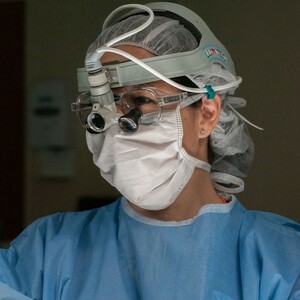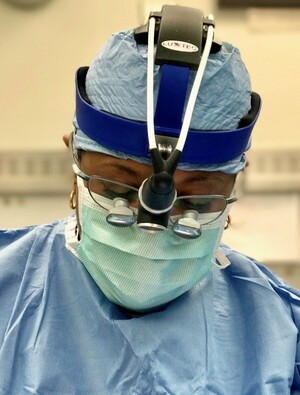- Adult Heart DiseaseDiseases of the arteries, valves, and aorta, as well as cardiac rhythm disturbances
- Pediatric and Congenital Heart DiseaseHeart abnormalities that are present at birth in children, as well as in adults
- Lung, Esophageal, and Other Chest DiseasesDiseases of the lung, esophagus, and chest wall
- ProceduresCommon surgical procedures of the heart, lungs, and esophagus
- Before, During, and After SurgeryHow to prepare for and recover from your surgery
February 1, 2018

In recent years, women have gradually made up greater proportions of medical school classes, with most medical schools in the United States currently fairly balanced between male and female students. However, women continue to be underrepresented in certain specialties, particularly in surgery. Cardiothoracic (CT) surgery is a fairly extreme example, with women constituting approximately 5% of practicing surgeons.
While we remain a small minority of the surgeons in our area of expertise, we must recognize that great strides have been made over the last 3 decades in terms of creating a space for women in CT surgery. As our field has evolved, we have experienced increasing support, encouragement, and opportunities. Women are slowly finding their way into positions of leadership and setting examples for young trainees interested in the specialty. We are certain that the future is bright, even for women like us who choose to be both surgeons and mothers.

Let’s face it: being a mother is a tough job and, at times, is much more challenging than our “day jobs” as CT surgeons. While the challenges of motherhood are not unique to women CT surgeons, there are many parallels that actually complement these two important roles. Caring for children is a 24-hour job, with no vacations (at least very rarely). We nurture our children when they are sick, cheer for them when they need encouragement, and anticipate trouble ahead to prepare for disaster.
In our homes, we are often thought of as the “fixers” of things. Our internal wiring and years of training and accountability kick in as second nature whenever there is a problem. CT surgeons are trained to prepare for every possible contingency to avert misfortune, but in the face of adversity, we are action oriented. We are the folks who spring into action and take charge of hopeless and chaotic situations (although we can still be thwarted at times by a colicky baby at 3:00 a.m.). Thus, most of us would argue that our professional training is an asset to motherhood in many ways.

Yet, try as we might, to don our virtual capes beneath our white coats or blue scrubs, determined to be Wonder Woman each day, the reality is harsher. CT surgeons work long hours with patients who also require 24 hours of care. Balancing the needs of our patients against those of our family (and inserting our own needs in there somewhere) can be incredibly challenging—but definitely possible. We do it on a daily basis: bit by bit. But mostly we do it with a ton of help! We have spouses and extended family members and support staff and professional services and our loving children who watch our every move and are growing to understand that the work we do is meaningful to many.
Despite the challenges of being both mothers and CT surgeons, we firmly believe that carrying these two titles simultaneously is not only possible, but enormously rewarding. We believe that our career experiences shape the way that we mother our children, and hopefully set an example for them as to what it means to work toward a goal and to help others. Likewise, we hope that our patients see value in the traits that we have honed via our experiences as mothers.
Benefits for Patients
As any parent knows, there are certain skills that we all learn through our experiences with children. We succeed in parenthood as we practice patience, tolerance, tenderness, warmth, and an ability to communicate with others who may not share our same knowledge.
Motherhood hones our expertise in multitasking and our ability to maintain calmness under pressure which is particularly useful for surgeons performing technically challenging operations. Moreover, motherhood provides us with an understanding of the enormous importance of family during times of illness. Oftentimes, patients will inquire about our families and they may catch a glimpse of one of our children on a leisurely Saturday morning rounds. We think this helps patients feel more connected to us in a way and actually strengthens the physician-patient bond.

Advice for Future CT Surgeons
For anyone who is interested in following in our footsteps as both mothers and CT surgeons, here are some lessons we’ve learned along the way:
- Don’t be afraid to accept help at home. You will need it! Of course, selecting the right partner is imperative; having an understanding, committed co-parent goes a long way. But, by the same token, don’t expect your partner to do it all. You may have to let some things slide or outsource household tasks whenever feasible.
- Communicate to your children and show them that they are important to you. It is inevitable that you will miss some important events. When you do miss things, find a way to make your children feel special. Prioritize the “must-do” events and don’t waste time on tasks or events for your kids that don’t matter to them.
- When you have to choose work over family, explain it to your children. Even at very young ages, they will understand and be proud of you—eventually. There will be times when they don’t understand, but they will get it someday.
- Find a support network! This cannot be overstated. If there are women surgeons at your institution who can provide you with support, that’s great. But due to the lack of women in our field, there aren’t always same-sex mentors available locally. Seek other means of networking with women surgeons. It also is imperative to have relationships with your children’s friends’ parents who can pitch in for you in a pinch.
- Remember that all mothers feel guilty, and all good surgeons lose sleep at night over their patients. You will experience both of these emotions. Avoiding parenthood will not absolve you of guilt, nor will becoming a stay-at-home mom.
- Accept the fact that there are ups and downs, and when things go poorly at work, it will likely affect your home life and vice versa. But it’s important to remember that it is normal for everything to snowball at once, and it also will all seem to suddenly get better at once. Just be strong through the rough patches and seek support as you need it.
- Know that your mentors may not necessarily be women or surgeons. Your male colleagues can be incredibly supportive so don’t be afraid to take them up on their offers for support as well. Most of them have significant others and children and also have valuable insight here as well; so don’t count them out!

Most important, don’t forgetting to take time out for yourself. You might not have a lot of time for self-care, but find a way to fit it in as part of your routine.
There is no single giant scale upon which to measure the quality of one’s “mothering.” Our goal is simple—produce happy, well-adjusted adults. Children are resilient, but they are not tough as nails. They do need us to slow down and focus. We must listen to them and love them like only their mothers can. And since their mothers happen to be CT surgeons, their childhoods will be shaped by unique experiences like rounds in the ICU, “playing” on a surgical robot, learning how to suture, traveling all over the globe to surgical conferences, meeting new people, mastering FaceTime calls while Dad makes one of his masterpiece gourmet meals. Oh, and, of course, all enhanced with knowing that their mother is one Badass Surgeon!
The opinions expressed in this article are those of the author and do not necessarily reflect the views of The Society of Thoracic Surgeons.

